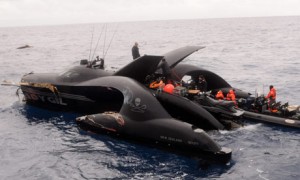Posted 9:01am 21st September 2012
”BEING CALLED A ‘TURNCOAT’ BY CAPTAIN WATSON OF SEA SHEPHERD IS DISINGENUOUS TO PUT IT MILDLY”, SAYS EARTHRACE FOUNDER, PETE BETHUNE
Recent press releases and statements issued by the Sea Shepherd Conservation Society have sought to blame Pete Bethune for many of the legal problems that the organisation and its ‘iconic’ founder, Captain Paul Watson currently face in connection with Interpol ‘Red Notices’ issued on behalf of Japan and Costa Roca.
Bethune has spoken up reluctantly in order to clarify his position and strongly refute the allegations.
He said, “For Sea Shepherd to call me a ‘turncoat who swapped his own head for Captain Watson’s’ in order to ‘avoid serving a prison sentence in Japan’, is disingenuous to put it mildly. I spent five months in a maximum security prison awaiting trial, and anything I said during the trial was said on the advice of Sea Shepherd’s lawyers.
“The time I spent locked up is longer than anyone else who has been imprisoned whilst working under Paul Watson for Sea Shepherd as a volunteer, not to mention a great deal longer than Paul Watson has ever had to experience himself.”
It is no secret that Watson is in ultimate charge of all his volunteers, and what he says, goes. Like all the other volunteers, Bethune would have followed Watson’s orders had he told him not to board the Shonan Maru #2 after the Ady Gil, the world-record breaking boat that by then sported the Sea Shepherd logo on its hull, was rammed. At no time did Watson ever issue that order.
Bethune says, “If SSCS was not prepared for the consequences of the boarding which were always going to implicate the organisation and the man in charge as well as myself, they should never have asked for volunteers to attempt it, nor should Watson have ever approved the mission in its entirety.”
As Watson’s own organisation’s press release stated at the start of Bethune’s trial, “Sea Shepherd’s Seattle-based law firm, Harris & Moure, will have two of its lawyers in Tokyo during the trial both to assist Bethune’s Japanese defense team and to explain Sea Shepherd’s position regarding the trial and Japan’s illegal whaling operations”.
Bethune explains, “If Paul felt that what I did was off my own bat, solely my responsibility and no-one else’s, why were his lawyers, paid for by Sea Shepherd, there helping me and making contributions to the trial on behalf of Sea Shepherd.
Bethune was strongly advised to concede to four charges and fight the fifth. He says, “Of course I took the advice the lawyers gave me which was that if I refused to say anything, the legal bill would be $2 million, and I would probably be locked up for two years before the case was closed.
SSCS did lose some control of the legal process after they summarily expelled Bethune from the organisation while he was still in jail. This was unexpected and unwelcome news for Bethune which shocked him deeply.
Sea Shepherd claim they did this purposely in an attempt to help Bethune by showing that he would not be returning to the Southern Ocean Whale Sanctuary on future campaigns. However Bethune disputes this, still feeling it did more to harm his case than help it.
As far as Watson’s assertion that the Japanese are preparing a case against him based on Bethune’s evidence at his own trial, he says, “I, and every volunteer on board one of their vessels, or who has ever watched ‘Whale Wars’ knows that Paul regularly orders his crews to carry out prop fouling missions, fire butyric acid onto the Japanese vessels, or shine lasers at the whaling crews.
“All these are crimes that the Japanese could quite easily allege fall under ‘Damage to Property’, ‘Forcible Obstruction of Business’, and ‘Injury’ under Japanese law.
“Watson also says publicly and often that he and his crew have prevented the Japanese from killing thousands of whales and that the actions of SSCS under the captaincy of Paul Watson have cost the whalers millions of dollars. Under Japanese law, that is also ‘Forcible Obstruction of Business’. It is little wonder that the Japanese want to take legal action against Sea Shepherd, but it’s clear they don’t require any evidence from anyone else to feel they have a case.”
Bethune concluded, “Watson should stop blaming me for his predicament. To call me a turncoat is galling considering the sacrifices I made on Sea Shepherd’s behalf. The moment I boarded the Shonan Maru #2, I came under Japanese law, and I was prepared for the consequences. It would seem that Watson was not.”
